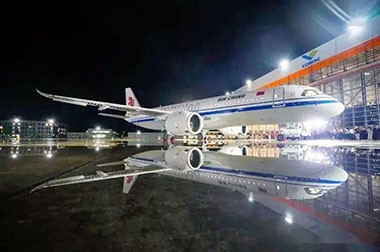7075 T73 Aluminum
7075-T73 is a high-strength aluminum alloy, known for its excellent balance between mechanical properties, stress corrosion resistance, and durability. This alloy is part of the 7000 series and is widely used in aerospace, military, and high-stress applications due to its unique properties.
7075-T73 aluminum is a high-strength alloy belonging to the Al-Zn-Mg-Cu series, a heat-treatable strengthened alloy, widely applied in aerospace, military, and high-end manufacturing fields for its excellent overall performance.
7075 T73 aluminum is a high-strength alloy in the 7000 series, which has been treated with a special aging process to achieve the T73 condition. This tempering process involves heat treating the material to the T6 condition and then further aging it—compared to T6, this additional step slightly reduces peak strength but significantly improves its stress corrosion cracking resistance and enhances its durability in high-stress or low-temperature environments.
7075 T73 Aluminum Mechanical Properties
| Property | Value (Typical) | Notes |
| Tensile Strength | 500–570 MPa (72–83 ksi) | Lower than T6 (570–83 ksi) due to overaging. |
| Yield Strength | 410–505 MPa (60–73 ksi) | Balances strength with ductility. |
| Elongation | 7–13% | Higher than T6 (7–11%), improving flexibility. |
| Brinell Hardness | ~140 HB | Slightly lower than T6 (~150 HB). |
| Fatigue Strength | 160 MPa (23 ksi) | Suitable for cyclic loading. |
7075 T73 Aluminum Thermal and Physical Properties
| Property | Value |
| Melting Range | 480°C - 640°C |
| Density | 2.81 g/cm³ (0.102 lb/in³) |
| Thermal Conductivity & Expansion | Good thermal conductivity and predictable thermal expansion |
7075 T73 Aluminum Chemical Composition
Main alloying elements: Zinc (5.1-6.1%), Magnesium (2.1-2.9%) and Copper (1.2-2.0%), along with trace amounts of Chromium, Iron, and Silicon.
| Element | Composition Range |
| Aluminum (Al) | 87–91% |
| Zinc (Zn) | 5.1–6.1% |
| Magnesium (Mg) | 2.1–2.9% |
| Copper (Cu) | 1.2–2.0% |
| Chromium (Cr) | Small amount |
| Iron (Fe) | Small amount |
| Silicon (Si) | Small amount |
| Manganese (Mn) | Small amount |
| Titanium (Ti) | Small amount |
7075 T73 Aluminum Heat Treatment Process and Its Effects
T73 Heat Treatment:
The T73 condition is achieved by first solution heat treating the 7075 alloy to the T6 condition, followed by over-aging.
This over-aging process results in coarser precipitates, which slightly reduce the peak strength but provide excellent stress corrosion cracking resistance and higher durability under prolonged stress or low-temperature conditions.
7075 T73 Aluminum Corrosion Resistance and Environmental Performance
- Stress Corrosion Cracking (SCC): T73 offers superior corrosion resistance compared to T6, making it highly suitable for harsh environments such as marine or high-humidity conditions.
- Spalling Resistance: Due to its stable microstructure, its performance exceeds that of T6.
- Low-Temperature Performance: Maintains toughness in low-temperature applications.
7075 T73 Aluminum Standards and Specifications
- ASTM B211: Covers bars, rods, and wire.
- AMS 4124: Standard for cold worked T7351 bars.
- AMS 4078: Specifies T7351 plate requirements.
7075-T73 aluminum is a versatile alloy that provides a strategic compromise between strength, corrosion resistance, and durability. Its aged T73 temper makes it an indispensable material for applications exposed to prolonged stress and corrosive environments, such as aerospace and marine engineering.
7075 T73 Aluminum Applications
Due to its unique high strength, excellent corrosion resistance, and enhanced durability, 7075 T73 aluminum is widely used in:
- Aerospace components (such as aircraft parts, gears, shafts, landing gear, and missile components)
- High-stress structural components in defense and industrial applications
- Applications where dimensional stability and long-term performance in harsh environments are crucial (such as low-temperature or corrosive conditions)
| Field | Application | Description |
| Aerospace | Wing spars, landing gear, fuselage components | 7075-T73 is widely used in aerospace applications, especially in wing spars, landing gear, and fuselage components. Due to its high strength and good corrosion resistance, 7075-T73 maintains structural integrity under extreme temperatures and pressure conditions. Its lightweight properties reduce the overall weight of aircraft, thus improving fuel efficiency. Additionally, 7075-T73 has excellent fatigue strength, ensuring the long service life of aerospace components. |
| Military | Armor components, firearm receivers | 7075-T73 is widely used in military applications, particularly in the manufacturing of armor components and firearm receivers. Its high strength effectively resists impact from high-speed bullets or fragments, providing excellent protection. Its low density also allows for lighter equipment while maintaining high strength, making it easier to carry and operate. The use of 7075-T73 in firearm receivers improves the durability and precision of weapons, reducing wear. |
| Automotive | Racing components, suspension systems | 7075-T73 offers indispensable advantages in the automotive industry, particularly in racing components and suspension systems. Due to its high strength and lightweight characteristics, 7075-T73 helps reduce the weight of racing cars, improving acceleration and handling performance. Its use in suspension systems allows it to effectively withstand the high pressures and impacts of high-speed driving while ensuring long-term durability and stability, reducing maintenance needs. |
| Marine and Industrial | High-stress gears, shafts, and structural components | In the marine and industrial fields, 7075-T73 shows outstanding performance as a material for high-stress gears, shafts, and structural components. Its excellent strength and corrosion resistance allow it to maintain a long service life in marine environments, especially under high-stress conditions, such as the extreme loads experienced by gears and bearings. 7075-T73 not only provides excellent corrosion resistance, reducing damage from seawater corrosion but also maintains high strength and stability in complex industrial environments. |
7075 T73 Aluminum Comparison with T6 Temper
| Property | T73 | T6 |
| Strength | Moderate | Maximum |
| Corrosion Resistance | High | Moderate |
| Ductility | Higher | Lower |
| Primary Use | Corrosive environments | High-strength, static loads |
7075 T73 Aluminum Machining and Manufacturing
- Machinability: Rated at approximately 70% of free-machining brass; due to its high hardness, sharp tools are required.
- Weldability: Limited to resistance welding; fusion welding is generally not recommended.
- Formability: Best under annealed conditions, but achievable in T73 with controlled processes.
When an application requires a material that combines the high strength of the 7000 series with better stress corrosion resistance, 7075 T73 aluminum is an excellent choice—this balance makes it particularly valuable in critical structural applications.




